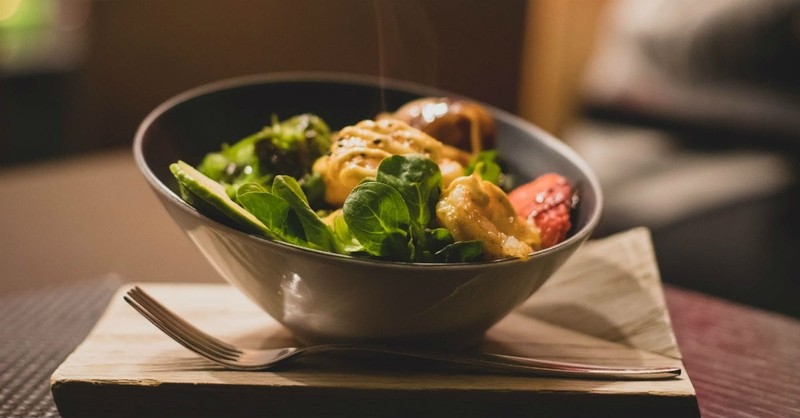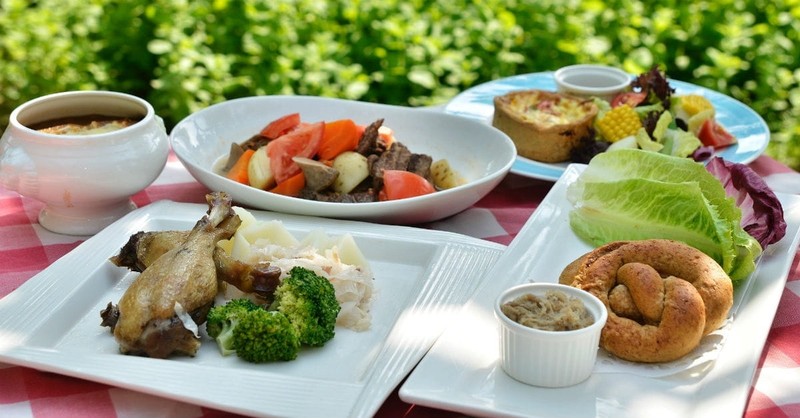
There’s nothing evil about a chocolate bar. Or a bag of potato chips. Or a half gallon of ice cream. But these foods are out of bounds if God has told me “no.” Even good foods like bananas and avocados can be off limits if the Lord has told me to set them aside for a while.
Although the effects of fat, sugar, and carbohydrates can be disputed all day, for the Christian the issue isn’t so much about food and ingredients as it is following God in obedience.
Let me explain.
Photo Courtesy: Unsplash

Others May, You Cannot
Early in my walk with Christ, I read a tract titled “Others May, You Cannot” by G.D. Watson. I discovered the journey of obedience isn’t always clear if I simply look to conventional wisdom, the lives of my fellow Christ-followers, or even my deceitful heart. As Watson writes, I need to “deal directly with the Holy Spirit” and allow Him to guide my choices.
Sometimes my biggest struggle as an older woman is the belief that “food is my only indulgence”—as if that covers up the truth about my willful gluttony.
In some cases, I sense a clear, “No, not that.” At that point, I can either indulge in my fleshly desires or stay in step with the Spirit and obey His prompting (Gal. 5:16–17). That doesn’t mean I can never have dessert, but rather I must ask for wisdom with a heart committed to obey whatever God tells me in each circumstance (James 1:5; 1 Kings 8:61).
Photo Courtesy: Unsplash

The Heart Makes Our Decisions
The key is my heart. Erwin Lutzer wrote, “Your heart is the place where life makes up its mind.” The heart is where we decide if we will obey.
One of the Scriptures that frames my heart’s choices is Matthew 6:33: “Seek first the kingdom of God and his righteousness.” Over time, I’ve come to equate “righteousness” with “right choices.” (Those words even sound the same!) If we want to live wisely regarding what we eat, we need to make right choices as God leads us, not as our appetites urge us.
Photo Courtesy: Unsplash/Chris Arock

A Time and a Place
Unlike many other temptations we encounter, the urge to overeat is always with us because we all must eat. If we have a tendency toward overeating or unhealthy eating, we need spiritual discernment to deal with our daily encounters with food.
I’m never surprised when I see people struggle with making wise choices at potlucks and banquets at church. Paul warned those preparing to eat the Lord’s Supper to get their nourishment at home first so they wouldn’t selfishly pig out at their time of fellowship! God wants us to eat when we’re hungry and stop when we’re satisfied. But we have redefined “satisfied,” haven’t we?
Certainly there were times of great feasting in the Bible—wonderful times of celebration at God’s designated festivals or “holy convocations.” There is a time and a place in the plan of God to eat, and many of these times will involve celebration. I’m looking to one such future event—the Marriage Supper of the Lamb!
So celebrations are proper, but we need discernment for these special times. We need to check our hearts. Are we truly willing to obey the Lord when it comes to our eating habits?
Photo Courtesy: Thinkstock

Sustenance Does Not Equate to Indulgence
Our gracious Lord gives us “daily bread.” He provides sustenance for strength and nourishment in many wonderful ways. But this does not equate to food-related indulgence that can lead to poor health or weakened resolve to discipline our bodies and lives.
Sustenance is not the same as gluttony.
Photo Courtesy: Pexels

Gluttony is Disobedience
While eating or not eating won’t ever commend us to God (1 Cor. 8:8), the Lord is rightly concerned about why we eat: whether we are seeking Him and if we’re eating to honor Him. We all tend to justify stuffing our bellies, don’t we? (Consider Thanksgiving Day bloat.) “Stuffing” is a temptation as old as time. The English reformer Thomas Cranmer wrote, “What the heart loves, the will chooses and the mind justifies.”
While it’s true that God gives us all things richly to enjoy, it’s foolish to ignore the consequences of out-of-control overeating, especially if it becomes a habit.
The Church often encourages people to obey God’s instruction about sexual morality, alcohol, and a host of other issues, but gluttony is an issue Christians choose to ignore. We accept or tolerate gluttony, even though the Scriptures warn us about its destructiveness.
Photo Courtesy: Pexels

Overeating Suggests a Lack of Godly Self-Control
While eating and drinking nutritiously are connected to honoring God with our work (Eccl. 5:18), the Bible says overeating is related to laziness. And the writer of Proverbs suggests it’s far more serious than we think!
Aside from some foods not being good for us in quantity, overeating suggests we lack godly self-control—that we are unable to control our appetites. God gives us many foods to enjoy, and we honor Him when we eat food in appropriate ways and quantities. We don’t want food to control us; we want to obey the Holy Spirit and allow Him to control our choices.
Photo Courtesy: Unsplash

God Knows What is "Beneficial"
The truth is, God is God and I am not. I want to seek Him concerning my eating because He knows what is truly beneficial for me at any given time.
We may think we have a right to do anything we want—and our culture cultivates this kind of independent thinking. I’ve noticed this especially in some older Christians who declare: “I have earned the right to indulge.” But is that true? Paul said in 1 Corinthians 6:12 that “not everything is beneficial” and he didn’t want to be “mastered” by anything. Although this passage speaks specifically about sexual immorality, the principle can be true for any sinful and lustful habit—even overeating.
I wasn’t sure whether to laugh a few years back when Nabisco came out with an ad for SnackWell’s chocolatey Cookie Cakes with the headline, “Go ahead. Worship the Devil’s Food.” Of course, when I thought about that more, I knew I could eat Angel’s Food cake and be just as “idolatrous.” Idolatry is worshiping anything other than God and—I’ll admit it—there have been days I’ve basically “worshiped” Dove candies. It’s dangerous to hunger for something other than God.
Photo Courtesy: Unsplash

God Wants Us to Trust and Obey Him
Look at the covers of many women’s magazines, and you’ll see conflicting messages. There are articles about weight loss adjacent to articles for high-calorie foods. Oh, the power of enticement at the checkout stand!
The simple truth is that God knows what is best for us, and when He speaks truth into our lives, He expects us to obey that truth for our benefit and His glory. There’s a definite “trust and obey” connection. God wants us to trust and fear Him and not lean on our own understanding (Prov. 3:5–7). He wants us to eliminate what is bad for us, and He may even challenge us concerning what we consider “good” to see if we will obey Him.
But we don’t always want to obey, do we?
Photo Courtesy: Unsplash

Rebellious Bites
In Scripture, rebellious attitudes are sometimes listed alongside gluttony. Deuteronomy 21:20 speaks of a stubborn and rebellious son who would not obey his parents, and he is described as “a glutton and a drunkard.” Ezekiel, condemning the inhabitants of Jerusalem for many sins, said God’s people acted like those who dwelled in arrogant, rebellious Sodom. Among other sinful behaviors, they were “overfed.”
Remember Eve? The first sin concerning food was related to an act of disobedience and rebellion against authority (Gen. 3:6). I assume Adam and Eve ate many good and beneficial foods God provided before that rebellion. We aren’t told. But we do know Eve chose to take that first rebellious bite!
Photo Courtesy: Thinkstock

If We Love Him, We Will Obey Him
We are faced with food choices every day, and we can either rebel against godly wisdom or embrace it. Psychologists tell us the antidote to rebellious eating is self-empowerment, but the real cure is repenting of our proud and rebellious spirit, seeking God’s will, and choosing to obey Him in order to bring Him glory. If we love Him, we will obey Him (John 14:15). Why do we make exceptions for our eating habits?
It turns out, obedience can have a lot to do with a chocolate bar or any other food when God says “no,” “not for you,” or “not today.”
When do you struggle most to obey the Lord concerning your eating? How can you make some creative choices to set yourself up for obedience rather than disobedience?
This article originally appeared on reviveourhearts.com. Used with permission.
Dawn Wilson and her husband Bob live in Southern California. They have two married sons and three granddaughters. Dawn assists Nancy DeMoss Wolgemuth with research and works with various departments at Revive Our Hearts. She is the founder and director of Heart Choices Today, publishes at Upgrade with Dawn, and is a regular columnist for Crosswalk.com. Dawn occasionally travels with her husband in ministry with Pacesetter Global Outreach.
Photo Courtesy: Unsplash
Originally published Thursday, 02 August 2018.



